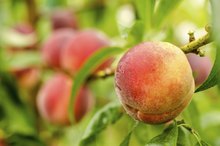What does fact checked mean?
At Healthfully, we strive to deliver objective content that is accurate and up-to-date. Our team periodically reviews articles in order to ensure content quality. The sources cited below consist of evidence from peer-reviewed journals, prominent medical organizations, academic associations, and government data.
The information contained on this site is for informational purposes only, and should not be used as a substitute for the advice of a professional health care provider. Please check with the appropriate physician regarding health questions and concerns. Although we strive to deliver accurate and up-to-date information, no guarantee to that effect is made.
Do Lemons Contain Fructose?
Lemons contain fructose, a natural sugar common to most fruits. However, compared to many other fruits, lemons contain relatively low amounts of fructose. High levels of fructose can cause irritation in the bowel and intestines. As of 2011, several studies point to negative effects of fructose, though overall evidence is inconclusive. Despite the issues with fructose, lemons are a good source of nutrition.
Fructose
Fructose is a simple sugar, or monosaccharide, found in fruit, some vegetables and natural substances such as honey. Fructose occurs in different concentrations in fruit. Lemons contain low doses. Fructose joins together with glucose, another monosaccharide to make the disaccharide sucrose, or table sugar. Unlike glucose, your body cells don't use fructose directly. Instead, the liver breaks down fructose into different chemicals.
- Fructose is a simple sugar, or monosaccharide, found in fruit, some vegetables and natural substances such as honey.
- Instead, the liver breaks down fructose into different chemicals.
Lemons and Sugars
Fruits with Low Concentrations of Fructose
Learn More
Around 2.5 percent of every lemon is made up of sugars. That means a medium lemon of 2-1/8-inch diameter contains 1.45 g of sugar, according to the USDA Nutrient Database 1. Fructose makes up much of this total. However, according to the University of Virginia Digestive Health Center, lemons and other acid fruits, such as limes, contain some of the lowest fructose levels of all fruits. The university's site lists lemons as "intestine friendly" for people sensitive to fructose in their diets.
- Around 2.5 percent of every lemon is made up of sugars.
- However, according to the University of Virginia Digestive Health Center, lemons and other acid fruits, such as limes, contain some of the lowest fructose levels of all fruits.
Low Fructose Diet
According to UCSF pediatric neuroendocrinologist Robert Lustig, fructose may have a negative impact on health. The liver converts fructose in part into triglycerides, as well as uric acid and free radicals. All of these can cause harm in the body. Triglycerides can cause heart disease and obesity. Free radicals attack healthy cells. Uric acid is a toxin that the body needs to remove. For these reasons, many people follow a low fructose diet. Lemons, as a low fructose fruit, may feature in this diet.
- According to UCSF pediatric neuroendocrinologist Robert Lustig, fructose may have a negative impact on health.
- For these reasons, many people follow a low fructose diet.
Considerations
What Are the Health Benefits of Citrus Pulp?
Learn More
Neither kids nor adults usually choose to have a glass of lemon juice to quench their thirst. The sourness of the juice makes it more suitable for squeezing into dishes during cooking or adding a small amount to smoothies. This means that even if lemons contained more fructose, you would be unlikely to consume too much of it anyway. If you're worried about your fructose intake, the fructose in lemons shouldn't be high on your list of dietary concerns.
- Neither kids nor adults usually choose to have a glass of lemon juice to quench their thirst.
- If you're worried about your fructose intake, the fructose in lemons shouldn't be high on your list of dietary concerns.
Related Articles
References
- USDA National Nutrient Database
- UCSF; Sugar Is a Poison, Says UCSF Obesity Expert; Jeffrey Norris; June 25, 2009
- Virtual ChemBook Elmhurst College; Fructose; Charles E. Ophardt; 2003
- Harvard Health Publications; Is Fructose Bad for You?; P.J. Skerrett; April 26, 2011
- Popkin BM, Hawkes C. Sweetening of the global diet, particularly beverages: patterns, trends, and policy responses. Lancet Diabetes Endocrinol. 2015;4(2):174-186. doi:10.1016/S2213-8587(15)00419-2
- New Hampshire Department of Health and Human Services. How much sugar do you eat?. Updated August 2014.
- DeSilver D. How America's diet has changed over time. Pew Research Center. Updated December 13, 2016.
- Lakhan SE, Kirchgessner A. The emerging role of dietary fructose in obesity and cognitive decline. Nutr J. 2013;12:114. doi:10.1186/1475-2891-12-114
- Djiogue S, Nwabo Kamdje AH, Vecchio L, et al. Insulin resistance and cancer: the role of insulin and IGFs. Endocr Relat Cancer. 2013;20(1):R1-R17. doi:10.1530/ERC-12-0324
- Page KA, Chan O, Arora J, et al. Effects of fructose vs glucose on regional cerebral blood flow in brain regions involved with appetite and reward pathways. JAMA. 2013;309(1):63-70. doi:10.1001/jama.2012.116975
- Goran MI, Ulijaszek SJ, Ventura EE. High fructose corn syrup and diabetes prevalence: a global perspective. Glob Public Health. 2013;8(1):55-64. doi:10.1080/17441692.2012.736257
- Walker RW, Dumke KA, Goran MI. Fructose content in popular beverages made with and without high-fructose corn syrup. Nutrition. 2014;30(7-8):928-35. doi:10.1016/j.nut.2014.04.003
- American Heart Association. Added sugars. Updated April 17, 2018.
Writer Bio
Based near London, U.K., Peter Mitchell has been a journalist and copywriter for over eight years. Credits include stories for "The Guardian" and the BBC. Mitchell is an experienced player and coach for basketball and soccer teams, and has written articles on nutrition, health and fitness. He has a First Class Bachelor of Arts (Hons.) from Bristol University.









